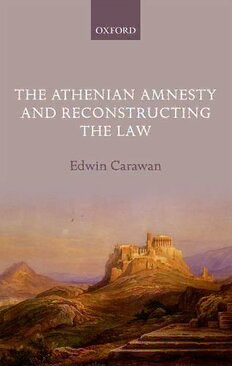Table Of ContentOUPCORRECTEDPROOF–FINAL,4/10/2013,SPi
THE ATHENIAN AMNESTY AND
RECONSTRUCTING THE LAW
OUPCORRECTEDPROOF–FINAL,4/10/2013,SPi
OUPCORRECTEDPROOF–FINAL,4/10/2013,SPi
The Athenian
Amnesty and
Reconstructing
the Law
EDWIN CARAWAN
1
OUPCORRECTEDPROOF–FINAL,4/10/2013,SPi
3
GreatClarendonStreet,Oxford,OX26DP,
UnitedKingdom
OxfordUniversityPressisadepartmentoftheUniversityofOxford.
ItfurtherstheUniversity’sobjectiveofexcellenceinresearch,scholarship,
andeducationbypublishingworldwide.Oxfordisaregisteredtrademarkof
OxfordUniversityPressintheUKandincertainothercountries
#EdwinCarawan2013
Themoralrightsoftheauthorhavebeenasserted
FirstEditionpublishedin2013
Impression:1
Allrightsreserved.Nopartofthispublicationmaybereproduced,storedin
aretrievalsystem,ortransmitted,inanyformorbyanymeans,withoutthe
priorpermissioninwritingofOxfordUniversityPress,orasexpresslypermitted
bylaw,bylicence,orundertermsagreedwiththeappropriatereprographics
rightsorganization.Enquiriesconcerningreproductionoutsidethescopeofthe
aboveshouldbesenttotheRightsDepartment,OxfordUniversityPress,atthe
addressabove
Youmustnotcirculatethisworkinanyotherform
andyoumustimposethissameconditiononanyacquirer
BritishLibraryCataloguinginPublicationData
Dataavailable
LibraryofCongressCataloginginPublicationData
Dataavailable
ISBN 978–0–19–967276–9
Printedandboundby
CPIGroup(UK)Ltd,Croydon,CR04YY
LinkstothirdpartywebsitesareprovidedbyOxfordingoodfaithand
forinformationonly.Oxforddisclaimsanyresponsibilityforthematerials
containedinanythirdpartywebsitereferencedinthiswork.
OUPCORRECTEDPROOF–FINAL,4/10/2013,SPi
Contents
Acknowledgements vii
AbbreviationsandConventions viii
1. Introduction:AmnestyandReconstruction 1
}1. Amnesty,Truth,andReconciliation 2
}2. ReconstructingtheLaw 7
2. ABriefHistoryoftheProblem 21
}1. BeforetheAristotelianAccount(Ath.Pol.38–40) 23
}2. APreviewoftheAristotelianAccount 30
}3. ScholarshipafterAth.Pol. 35
3. Comparanda:TreatiesandDecreesIllustratingtheNature
oftheSettlement 43
}1. BeforeAmnēstia 45
}2. AmnēstiaandOtherAdaptations 56
}3. TheElementsoftheAthenianSolution 62
4. TheEvolvingAgreement 67
}1. TheDealwithEleusis 70
}2. PropertyandPoliticalRightsatAthens 81
5. Paragraphēand‘CivilSuits’:IsokratesAgainstKallimachos 91
}1. TheQuarrelwithKallimachos 92
}2. TheContractualCharacteroftheReconciliation
Agreement 96
}3. TheSequenceofLegislationAffectingProperty
RightsandPrivateSuits 109
6. TheHomicideRuleandtheCaseAgainstAgoratos 115
}1. TheDateoftheCaseandtheTimeLimit 119
}2. TheHomicideRuleandtheRequirementep’autophōrōi 125
}3. FramingtheIssue:AitiosandAndrophonos 127
}4. TheImpactofthisCaseandtheSequence
ofAdaptations 136
7. TheSpecialAccountingsandLysiasAgainstEratosthenes 139
}1. JurisdictionintheAccountings 144
OUPCORRECTEDPROOF–FINAL,4/10/2013,SPi
vi Contents
}2. TheHomicideCharge 150
}3. PartiestotheAccounting 153
}4. TheCaseAgainsttheThirty 165
8. Andokides’DefenceandtheAmnestyLegislation 171
}1. TheCaseAgainstAndokides:[Lysias]6 175
}2. FramingtheArgument 177
}3. Patrokleides’Decree(73–80) 180
}4 The‘ScrutinyoftheLaws’ 182
}5. The‘LawthatyouallApply’ 189
}6. MakingExamplesofhisAccusers(92–9) 194
}7. TheConnectiontoTeisamenos’DecreeandOther
Reforms 195
Appendix:Anoutlineofthedocumentsreferenced
inAndokides’legalargument(77–99) 202
9. TheCaseAgainstSocrates 203
}1. WordsandtheirConsequences 204
}2. TheLinkwithKritias 212
}3. Xenophon’sApologyandtheWebofComplicity 217
}4. Plato’sApproachtotheIssueofInfluence 223
}5. TheEvolvingOath 229
10. TheCaseAgainstNikomachosandRewritingtheLaws 233
}1. TheCharacteroftheAnonymousAccuser 233
}2. TheSacredCalendarandtheChargesAgainst
Nikomachos 238
}3. TheTimingoftheCharges 243
11. TheLegacyoftheReconciliation 251
}1. RightsandRecriminations 255
}2. RestraintofLitigation 261
}3. ReformofLegislationandtheRemedyAgainst
‘UnfittingLaw’ 265
12. ConclusionsandDefiningIssues 277
Timeline:Aroughchronologyofthespeeches
andrelevantreforms 285
References 287
IndexLocorum 303
GeneralIndex 308
OUPCORRECTEDPROOF–FINAL,4/10/2013,SPi
Acknowledgements
This book has been many years in the making, and so I have accu-
mulated debts to quite a number of colleagues and friends for their
patienceandencouragement.Tobeginneartheend:
The National Endowment for the Humanities awarded me a fel-
lowship with which to carry on this project, and I am deeply
honouredandgratefulforthissupport.
TomycolleagueshereatMissouriStateUniversityIamalsomuch
obliged,especiallytoJosephHughesandPaulineNugent,whosustain
ourprogrammeinClassicsandinevitablyshouldermoreoftheload
whenIgoonleave.
AndIamindebtedtocolleagueselsewhere,fortheircriticismand
clearersenseofwheretheevidencemightlead:especiallytoJoshOber
andHarveyYunis,whogaveinvaluablecommentaryondraftsofthis
study;andtotherefereesandeditorsforOxfordUniversityPress,for
theirgraspofthebigissuesandforcountlesssmallercorrections.On
thecaseof Socrates,Ihave alsoprofitedfrom discussionatthe2010
meetingoftheAmericanSocietyforLegalHistory,withAlanBoege-
hold, David Phillips, Mark Sundahl, and Russ Versteeg, and at the
University of Missouri at Columbia in 2012, with Anatole Mori,
DavidSchencker,DennisTrout,andIanWorthington.
Reaching back more than a few years, I owe more than thanks to
mywife,AlisonParker,stillmymosttirelesscritic.Iwouldalsoliketo
thank Adele Scafuro and David Konstan, for sharing a cab in a
snowstorm in 1993 and sharing some of the ideas that shaped this
project. And last but not least remembered, I must acknowledge a
debttotwoscholarswhoseguidanceandexamplehavebeenvitalto
this work, both of whom passed away in 2010: Douglas MacDowell
andMartinOstwald.
OUPCORRECTEDPROOF–FINAL,4/10/2013,SPi
Abbreviations and Conventions
For most Greek authors and their works, as well as persons and places
mentioned in those works, names and titles are transliterated from the
Greek,1 and abbreviations are based on the transliteration: e.g. Aischines
(Aischin.),Isaios(Is.),Isokrates(Isok.).
For names commonly used in English it seems best to keep the familiar
form: thus Aristotle (Arist.), Pericles, Plato (not Platon), Plutarch (Plut.),
Socrates,Thucydides(Thuc.).
Formodernworks,abbreviationsarethoseusedinTheOxfordClassical
Dictionary(3rdedn)and(wherelackinginOCD)L’AnnéePhilologique.Note
also:
APF J.K.Davies,AthenianPropertiedFamilies,600–300B.C.,
Oxford,1971.
BengtsonSV H.Bengtson,DieStaatsverträgedesAltertums,vol.2:Die
Verträgedergriechischen-römischenWeltvon700bis338
v.Chr.Berlin,1972.
BlassAB F.Blass,DieattischeBeredsamkeit,2ndedn,3vols,
Leipzig, 1887–1898 (3rd edn, Hildesheim, 1962; repr.
NewYork,1979).
BNJ I.Worthington(ed.),Brill’sNewJacoby(onlineresource),
Leiden.
Diels–Kranz H.DielsandW.Kranz(eds),DieFragmentederVorsok-
ratiker,3vols.DublinandZurich,6thedn.1951.
FGrH F.Jacoby,FragmentadergriechischenHistoriker,Leiden,
1923–.
IG InscriptionesGraecae,Berlin,1873–.
IPArk G.ThürandH.Taeuber,ProzessrechtlicheInschriftender
GriechischenPoleis:Arkadien,Vienna,1994.
KirchnerPA J.Kirchner,ProsopographiaAttica,2vols,Berlin,1901–3
(repr.Chicago,1981).
LipsiusAR J.HLipsius,DasattischeRechtundRechtsverfahren,
3vols,Leipzig,1905–15.
1 AsinDerKleinePauly:LexikonderAntike,K.ZieglerandW.Sontheimer(eds),
Munich1979;abbreviationslistedBand1:xxi–xxiv.
OUPCORRECTEDPROOF–FINAL,4/10/2013,SPi
AbbreviationsandConventions ix
ML R.MeiggsandD.Lewis,ASelectionofGreekHistorical
Inscriptions to the End of the Fifth Century B.C., revised
edn,Oxford,2004.
RE A.Pauly,G.Wissowa,andW.Kroll(eds),Real-encyclopä-
diederclassischenAltertumswissenschaft,Stuttgart,1893–.
RhodesCAAP P.J.Rhodes,ACommentaryontheAristotelianAthenaion
Politeia,Oxford,1981(withaddenda,1993).
RO P.J.RhodesandR.Osborne,GreekHistoricalInscriptions:
404–323BC,Oxford,2003.
SIG3 W.Dittenberger,SyllogeInscriptionumGraecarum,3rd
edn,Leipzig,1915–24.
Tod M.N.Tod,ASelectionofGreekHistoricalInscriptions,2vols,
2ndedn,Oxford,1948(reprintChicago,1985).
ZRG ZeitschriftderSavigny-StiftungfürRechtsgeschichte,Roma-
nistischeAbteilung.
‘AA’and‘NN’standforanonymousprosecutoranddefendant,respectively
(adoptedfromRomanLaw,‘AulusAgerius’and‘NumeriusNegidius’).
Where the names are known, it is often convenient to use initials
insummarizingtheargument:e.g.KforKallimachos,NforNikomachos.
Uppercaseisusedtodistinguishkeyterms:
(cid:1) ‘Amnesty’ refers to the sum of arrangements that ended the civil
conflictin403/2bc;lower-case‘amnesty’isgeneric.
(cid:1) ‘City party’ refers to the oligarchic constituency in 404/3; in that
context, the ‘City’ refers to the astu, the city of Athens proper (apart
fromPeiraieusandotherneighbouringtowns).
(cid:1) ‘ReconciliationAgreement’referstotheinstrumentofsettlementin403;
or,wherecontextshouldsuffice,simply‘theAgreement’.

